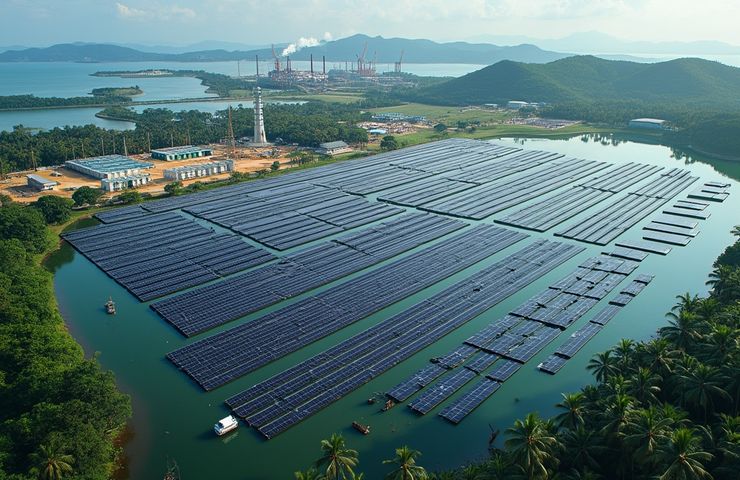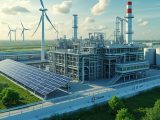
Aslan Energy Launches 1.2 GW Green Hydrogen Megaproject in Indonesia’s Batam Free Trade Zone
May 13, 2025Aslan Energy Capital is gearing up for something big in Batam, Indonesia — a massive 1,200 MWp solar and green hydrogen complex that could reshape Southeast Asia’s renewable energy landscape. Based out of Singapore, the company plans to break ground in 2026, with tender details now in the works and a full RFQ expected to land by the end of 2024.
A New Chapter for Batam
Batam, part of Indonesia’s Riau Islands, has long been known for shipbuilding and electronics. But now, it’s getting a clean-energy makeover. With help from Indonesia’s 2022 Hydrogen Roadmap and a national target of hitting 23% renewable energy by 2025, Batam is eyeing a future in green tech. Its location near the Singapore Strait and designation as a Special Economic Zone make it a prime spot for this kind of pivot — from industrial to sustainable.
Scale Meets Smarts
This isn’t just another solar project — it’s a hybrid powerhouse. The setup includes 700 MW of ground-mounted solar panels on old mining land and another 500 MW of floating solar arrays installed on defunct quarry reservoirs. The energy harnessed will power state-of-the-art PEM electrolyzers that turn desalinated seawater into green hydrogen, bound for industries in nearby Singapore and other energy-hungry zones across the region.
The project highlights some pretty cutting-edge tech:
- Double-sided solar panels with robotic cleaning — built to handle hot, humid coastal environments
- 84 kilometers of new transmission lines — linking scattered power generation units to the central hydrogen production hub
- Proton Exchange Membrane (PEM) electrolysis — known for its flexibility and high efficiency, especially when paired with solar
Jobs, Opportunities — and Sensitive Terrain
On the ground, this development is expected to generate more than 2,000 construction jobs and over 300 permanent technical roles. But big projects often come with trade-offs. Up to 15 coastal fishing communities might be affected by construction and infrastructure build-outs. According to Aslan, they’re putting a strong focus on community engagement and making sure the transition is both fair and inclusive.
They’re also making smart use of land — over 8,000 hectares of exhausted mining sites will be repurposed for clean energy generation. It’s a classic case of turning wasted land into a win for both the environment and the economy. If it works, it could set a precedent for other parts of ASEAN wrestling with land use after mining activity.
Southeast Asia Puts Its Stamp on the Global Hydrogen Map
This project isn’t just about local impact — it’s playing into a much bigger game. With rich sunlight, short export routes, and national policies that back hydrogen infrastructure, Southeast Asia is making a strategic play to rival large-scale hydrogen production hubs in the Middle East.
“The Riau Islands aren’t just about location — they’re about showing ambition. By 2028, we’re aiming for Batam to be exporting hydrogen that stands up to global competition on cost, logistics, and carbon transparency,” said a source involved in the early engineering stages.
Who’s Behind It All?
Aslan Energy Capital, launched in 2018, is no newcomer to big, bold sustainability ideas in Asia. Headquartered in Singapore, the company focuses on full-cycle, renewable-to-hydrogen systems. They’re also working closely with Indonesian government partners and solar tech firms to scale up green energy near major trade and industrial zones. For Aslan, it’s not just about clean tech — they’re equally invested in regenerating ecosystems and creating good-paying jobs in the process.
What’s Next?
Eyes are now on Q4 2024, when the formal RFQ drops — bringing clarity on engineering specs, construction partnerships, offtake plans, and environmental safeguards. If all stays on track, and the financial close wraps by late 2025, this could be one of Asia’s first commercial-scale green hydrogen export hubs up and running by 2026.
As industries worldwide push harder toward decarbonization — from steel to shipping — the big question is: Can Indonesia move fast enough to lead the charge, or will it get left behind by more experienced players? Either way, Batam’s making its move, and the world is watching.



 With over 15 years of reporting hydrogen news, we are your premier source for the latest updates and insights in hydrogen and renewable energy.
With over 15 years of reporting hydrogen news, we are your premier source for the latest updates and insights in hydrogen and renewable energy.